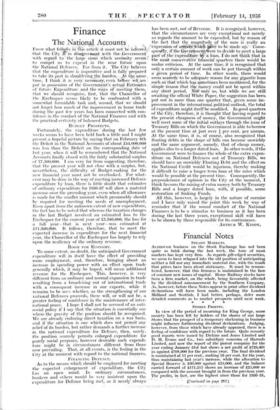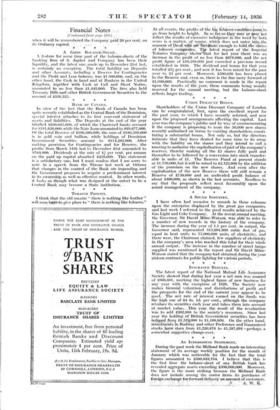Financial Notes
STEADY MARKETS.
ALTHOUGH business on the Stock Exchange has not been quite so brisk during the last week, the tone of most markets has kept very firm. As regards gilt-edged securities, we seem to have relapsed into the old position of anticipating neither a fall nor any immediate material rise, with the result that prices have been about stationary. It must be remem- bered, however, that this firmness is Maintained In the face of constant new issues of capital. Home Railway stocks have been a firm market, on the whole, being favourably affected by the dividend announcement by the Southern Company. As, however, before these Notes appear in print other dividend declarations will have been made, including the London Midland and Scottish, I had better, perhaps, defer more detailed comments as to market prospects until next week.
* * * *
STORES PROFITS.
In view of the period of mourning for King George, some anxiety has been' felt by holders of the shares or our large Stores that the prospect of a temporary slackening in business might influence forthcoming dividend declarations. Judging, however, from those which have already appeared, there is a feeling of confidence with regard to the future. Quite recently good reports were issued by Dickins and. Jones -Limited and D. H. Evans and Co., two subsidiary concerns of Harrods Limited, and now the report of the parent company for the year ending January 31st last shows a net profit of £729,431 as against £708,900 for the previous year. The final dividend is maintained at 11 per cent., making 16 per cent. fOr the year, thus maintaining last year's increase, while the allocation to Special Reserve is £30,000 against £20,000, and the balance carried forward of £171,215 shows an increase of £25,000 as compared with the amount brought in from the previous year. The profits, in fact, are the highest since those for 1930-31, (Contintiel-on page 2811 -
Financial Notes
(Continued from page 280.) •
when it will be remembered the Conipany paid 20 per cent. on
its Ordinary capital. - • ; . . 7 - * * * A GOOD BALANC*:SREET. A feature for some time past of the balance-sheets of the banking firm of S. Japhet and Company has been their liquidity, and the latest one, made up to December 31st last, is certainly no exception. The total. liability. on Deposits and other Accounts, including a Reserve for Contingencies and the Profit and Loss balance, was £1,960,000, and, on the other hand, the Cash in hand and at Bankers in the United `Ringfliim, together with Cash at Call and Short Notice, amounted to no less than £1,443,000. The firm also held Treasury Bills and other British Government Securities to the amount of £338,225.
* * * * BANK OF CANADA.
In view of the fact that the Bank of Canada has been quite recently established as the Central Bank of the Dominion, special interest attaches to its first year-end statement of assets and liabilities. The Deposits at the end of the year totalled $200,665,000, of which the Chartered banks account for 8181,636,000, while the Note Issue amounted to $99,677,000. Of the total Reserve of $186,380,000, the sum of $180,509,000 is in gold coin and bullion, while holdings of Dominion Government Securities amount to $114,283,000. After making provision for Contingencies and for Reserve, the profits from March 11th last to December 31st amounted to $764,000. Dividends at the rate of 4f per cent. per annum on the paid up capital absorbed $239,000. This statement is a satisfactory one, but I must confess that I am sorry to note in a speech from the Throne last week at Ottawa that changes in the control of the Bank are impending, and the Government proposes to acquire a predominant interest in its ownership as well as effective control. In other words,- it looks as though what was designed at the outset to be a Central Bank may become a State institution: .
* * • * * TOBACCO PROFITS.
I think that the old maxim " there is nothing like leather " will soon hoetto give place to " there is nothing like tobacco."
At all events, the profits of the big Cibacca:compineS4eem to go from height to height., In, so far.,aa•Vipy may :or iaay pot reflect the results of excessive indulgence in the weed by bath sexes is a matter, of course, which does not epter,into,..the concern of those wJl alli-iikrt4hate enough to hold the sha–res of tobacco companies: Tbb latest report of the Imperial Tobacco Coinpany ishOWelqhat for last year there was an increase in the profit of no less than £679,000, and the net profit figure of £10,268,000 just exceeded a previous record established in 1930. The dividend and bonus for that year totalled 24 per cent., and now it has been raised for the past year to 24 per cent. Moreover, £500,000 has been placed to the Reserve and, even so, there is the fine carry forward of £1,040,000. Praetically no comment is made in the report upon the results of the. year, these comments being usually reserved for the annual meeting, but the balance-sheet reflects larger trading.
* * * *
UNION DISCOUNT BONUS.
Shareholders of the Union Discount Company of London can be congratulated, first, upon the excellent report for the past year, to which I have recently referred, and now upon the proposed arrangements affecting the capital. Last year was the company's jubilee and by way of commemorating it the company is proposing to issue the 50,000 new shares recently authorised on terms to existing shareholders, consti- tuting a substantial bonus. Not only so, but the directors intimate that they have desired for some time to do away with the liability on the shares and they intend to call a meeting to authorise the capitalisation of part of the company's reserves, thereby making all the £5 shares fully paid and thereafter to be followed by a conversion into stock transfer- able in units of £1. The Reserve Fund at present stands at £1,750,000, but it will be raised to £2,125,000 by the addition of the premium -on the new shares. And even after the capitalisation of the new Reserve there will still remain a Reserve of £750,000 and an undivided profit balance of about £400,000, as shown in the last accounts. Needless to say that the proposals reflect most favourably upon the sound management of the company.
* * * *
A SOUND INDUSTRY.
I have often had • occasion to remark in these columns upon the enterprise • displayed by the great gas companies, and last- week I referred to the good results achieved by the Gas Light and Coke Company. At the receatannual meeting, the Governor, Sir David Milne-Watson, was able" to refer tp a number of new records in the history of the company. The increase during the year of 1.1 per cent. in output, the Governor said, represented 515,091,600 cubic feet of gas, equal in heat units to 75,000,000 units of electricity, and there were, the Chairman claimed, few suppliers of electricity in the company's area who reached this:Aotal for their whole annual output. The increase in the number of street lanips supplied was mentioned in the 'report and Sir David Milne- Watson stated that the company had obtained during the year sixteen contracts for.public lighting fcit-vdrious periods. - * * _ * • " INSURANCE RESULTS.
The latest report of the National Mutual. Life Assurance Society showed that during last - year a net 'sum was assured of £966,601, marking the highest figure of new business for any year with the exception of 1928. the Society now makes biennial valuations and distributions of profit and the prospects-for the end of the current year appear -to be good. The net rate_ of interest earned on the funds was the high one of £4 6s. ld. per cent., although the company revalues. its securities each year and takes them into account at, market valpet_t This year, the result- of the revaluation Was- to add £202,888 to the society's resources. Since last year the holding- of British Government securities has been rojail frond £1,51$000 to 11,188;000. On the other hand, investm'e'nts m Railway and other Preference and Guaranteed stocks have-risen from £1,220,876 to £1,587,691—perhaps a somewhat suggestive change-over.
* * • * *
An INTERESTING STATEMENT.
During the past week the Midland Bank made an interesting statement of its average weekly position for the month of January which was noticeable for the fact that the total figures amounted to £500,833,734. I believe that thii is the first time the balance-sheet of any British- bank has revealed aggregate assets .exceeding £500,000,000. • Moreover, the figure is the more striking because the Midland Bank does not include among the contra items its purchases of foreign exchange forforwanideliyery on atount of customers.















































 Previous page
Previous page